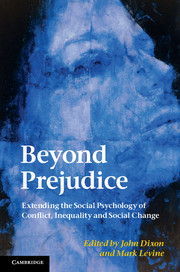Introduction
Published online by Cambridge University Press: 05 June 2012
Summary
Gehart Saenger’s book, The Social Psychology of Prejudice, was one of the first systematic attempts by a social psychologist to consolidate the early literature on prejudice. Its publication in 1953 was heralded by no less a figure than Gordon Allport as setting ‘forth truths that if applied would certainly diminish the ravages of bigotry in our society’. The book opens on a parable. An anonymous narrator deliberates upon the potential admission of a Jewish man, Sidney Levy, to an exclusive social club. Mr Levy seems to be ‘a nice person’, the narrator notes, and ‘Personally I would not mind if he joined the club’. However, he is ‘definitely Jewish’, and ‘you never know with them. Sooner or later their true nature will show through. Moreover, once we take him, he may invite his Jewish friends and before long the whole club will be overrun by these kikes’ (Saenger, 1953, p. 3).
Published the following year, the introduction to Allport’s own canonical text, The Nature of Prejudice (1954, pp. 13–14), featured a similarly vivid example. In this case, the reader is invited to overhear an imaginary conversation between a Mr X and a Mr Y, who are debating ‘the trouble with Jews’.In both books, then, stark parables of anti-Semitism introduced a concept that was to dominate the social psychology of intergroup relations in ensuing decades. In the readiness of Saenger’s and Allport’s protagonists to make hostile generalizations about members of another group and in the detachment of their attitudes from the facts of social reality, we find personified the elementary features of the concept of prejudice. Saenger (1953, p. 3) went on to define prejudice formally as a process whereby we ‘judge a specific person on the basis of preconceived notions, without bothering to verify our beliefs or examine the merits of our judgements’. Allport’s definition was more succinct. Prejudice, he famously observed, is ‘an antipathy based upon a faulty and inflexible generalization’ (1954, p. 9): it involves ‘thinking ill of others without sufficient warrant’ (1954, p. 6).
- Type
- Chapter
- Information
- Beyond PrejudiceExtending the Social Psychology of Conflict, Inequality and Social Change, pp. 1 - 24Publisher: Cambridge University PressPrint publication year: 2012
References
- 1
- Cited by

